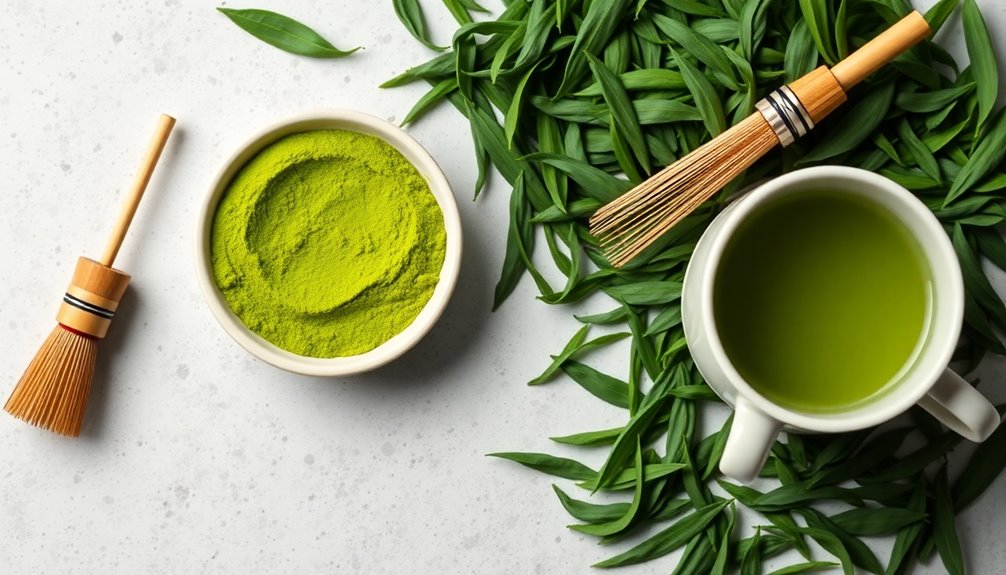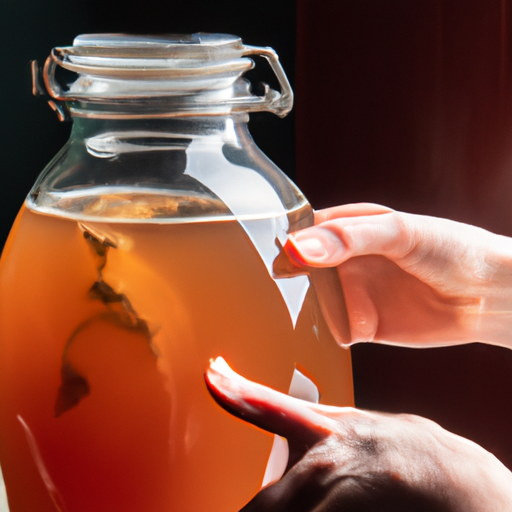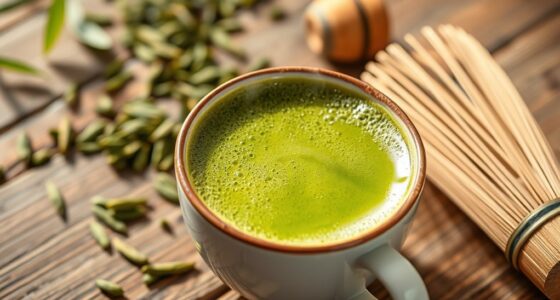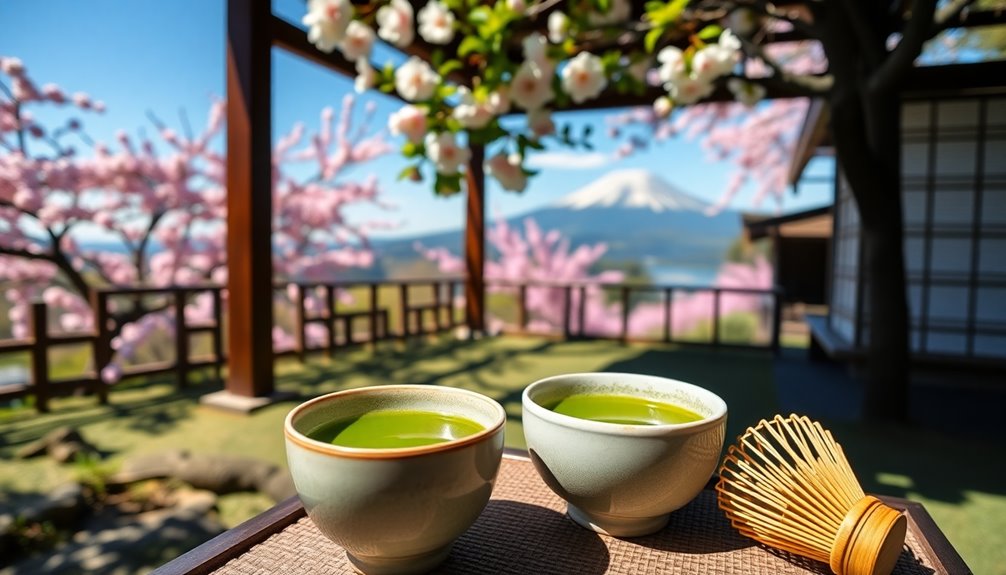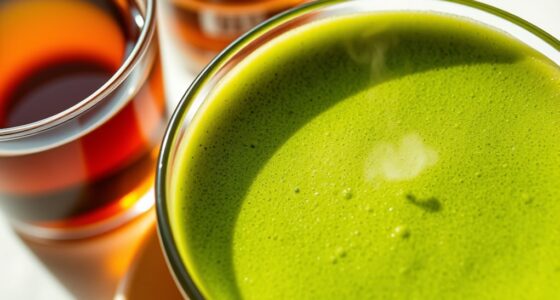Matcha and sencha are both tasty Japanese green teas, but they're quite different! Matcha is made from whole leaves ground to a fine powder, giving it a rich, umami flavor. You'll find it has more caffeine and lots of antioxidants for extra energy. Sencha, on the other hand, is made from steamed, rolled leaves, creating a lighter, grassy taste with milder caffeine. Here's a quick comparison:
- Matcha: strong flavor, high caffeine, great for baking.
- Sencha: lighter, easy to drink, perfect for a daily cup!
Excited to discover more about these delicious teas?
Key Takeaways
- Matcha is made from whole tea leaves ground into powder, while Sencha is produced from steamed, rolled leaves.
- Matcha has a rich umami flavor and higher caffeine content, about 68mg per serving, compared to the milder Sencha.
- Matcha is central to Japanese tea ceremonies, symbolizing mindfulness, while Sencha is enjoyed more casually in daily life.
- Culinary applications differ; matcha enhances both sweet and savory dishes, while Sencha is primarily consumed as tea.
- Environmental impact varies; matcha cultivation requires more resources due to shading, while Sencha generally has a lower footprint.
Introduction

When it comes to green tea, matcha and sencha stand out as two popular options that offer unique experiences. Both of these delightful teas come from the same plant, Camellia sinensis, but they've some exciting differences!
– Matcha: This tea is made from whole tea leaves that are finely ground into a powder. It has a rich, umami flavor and a higher caffeine content because you consume the entire leaf.
Plus, matcha is packed with antioxidants, boosting your health benefits, including better focus and a faster metabolism. Additionally, matcha can reduce the risk of certain diseases due to its high antioxidant levels.
– Sencha: On the other hand, sencha is made from steamed, rolled leaves and is the most popular green tea in Japan, making up 80% of their tea production.
It offers a lighter, grassy taste and a milder caffeine experience.
Whether you're sipping matcha or sencha, you're enjoying a flavorful journey through Japanese green tea culture.
Both teas aren't only delicious but also come with amazing health benefits.
Japanese Tea Ceremony Roots
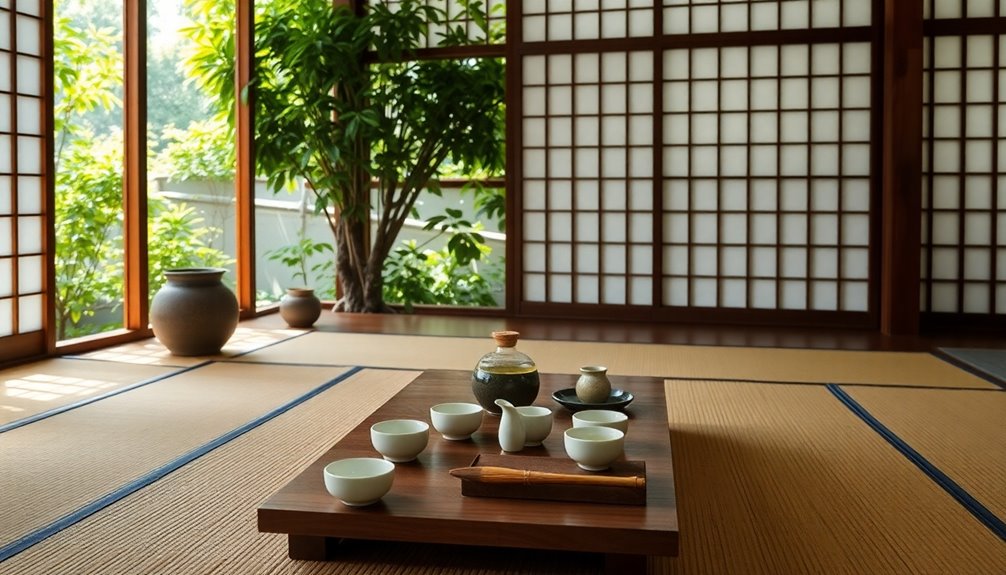
At the heart of Japanese culture lies the traditional tea ceremony, or "Chanoyu," which beautifully showcases the preparation and serving of matcha. This special event isn't just about drinking tea; it's an experience filled with cultural significance and mindfulness.
Matcha, a finely powdered green tea, became an essential part of the tea ceremony by the 15th century. It symbolizes harmony, respect, purity, and tranquility, connecting deeply with Zen Buddhism. During the ceremony, you'll see unique tools like the bamboo whisk (chasen) and the tea bowl (chawan) being used exclusively for matcha preparation.
Although sencha is enjoyed daily by many, it's not the star of formal tea ceremonies. Instead, the focus is on the beauty of matcha preparation. You'll notice how each step is intentional, encouraging you to savor the moment.
The historical transition from matcha's elite status to the more common use of sencha shows how tea culture has evolved in Japan. By understanding these roots, you can appreciate the joy and mindfulness of this cherished tradition, making every sip of matcha even more special!
Caffeine Content Varies Significantly
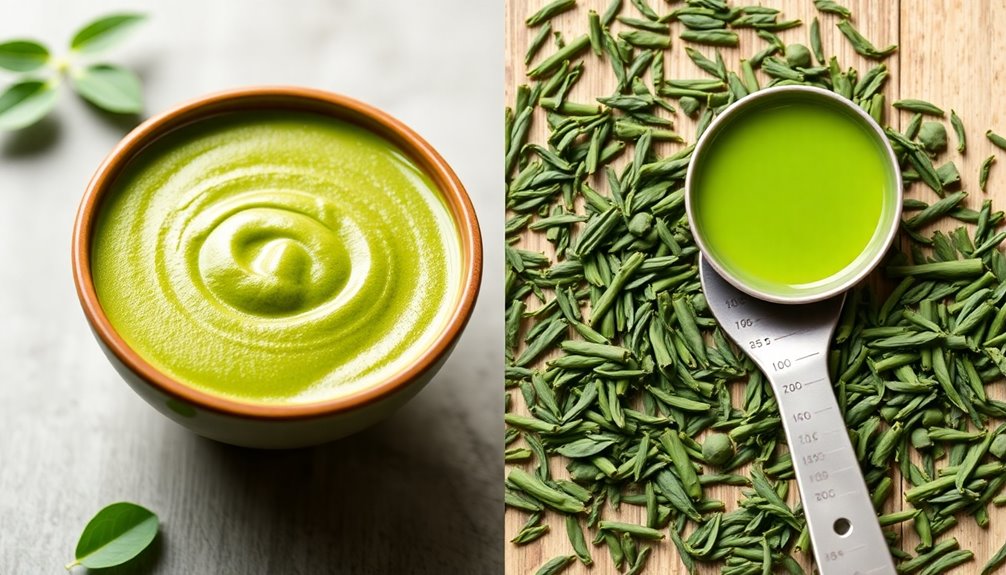
The differences in the caffeine content between matcha and sencha are striking and can significantly impact your tea-drinking experience. Matcha packs a punch with about 68mg of caffeine per serving, while sencha offers a milder caffeine experience. If you're sensitive to caffeine, sencha might be the better choice for you!
Why is matcha so strong? It's all about the whole leaf! When you drink matcha, you're consuming the entire powdered leaf.
Plus, the shading process during growth boosts its caffeine levels. For several weeks before harvesting, matcha plants are covered to increase their caffeine content, making it unique among Japanese green tea.
On the flip side, sencha has lower caffeine content, making it gentler on your system. This can be great for those looking for a calming sip.
Interestingly, matcha's caffeine often works in harmony with L-Theanine, an amino acid that promotes calm alertness. This means you can enjoy the health benefits of matcha without feeling jittery!
Culinary Uses of Matcha
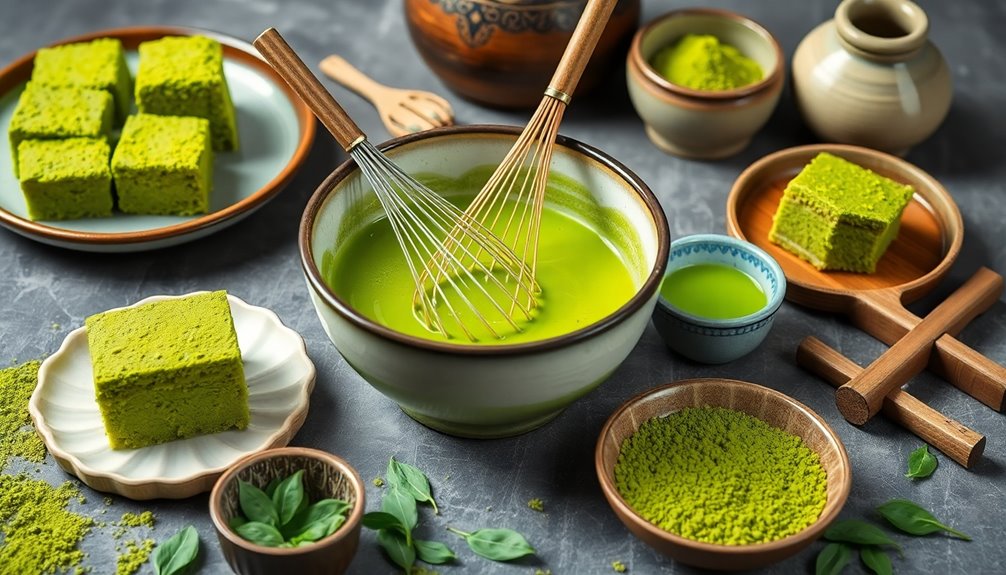
How can matcha elevate your cooking? This vibrant green powder isn't just for sipping; it's a superstar in the kitchen! You'll find matcha in various culinary applications, making everything more exciting, from baking to beverages.
- Baking: Add matcha to cakes, cookies, and pastries for a unique flavor and eye-catching color.
- Beverages: Blend it into lattes, smoothies, or teas, giving your drinks a delightful twist and amazing health benefits.
- Food Coloring: Use matcha as a natural food coloring agent in ice creams and chocolates. It enhances both taste and looks!
- Savory Dishes: This versatile ingredient can sprinkle over salads, mix into dressings, or even star in savory dishes.
When you choose culinary-grade matcha, you're in for a treat! It's a bit more bitter than ceremonial matcha, making it perfect for cooking.
With its incredible flavor and vibrant hue, matcha brings joy and creativity to your meals. So, roll up your sleeves and start experimenting with matcha—your taste buds will thank you, and your family will love the festive flair it adds to every dish!
Environmental Impact of Cultivation

Cultivating matcha and sencha involves distinct practices that significantly impact the environment.
Matcha cultivation requires a unique shading process, where tea plants are covered for several weeks. This boosts chlorophyll production but can increase resource inputs, affecting local ecosystems.
On the other hand, sencha, which grows in the bright sun, typically has a lower environmental footprint, using fewer resources and being easier on the land.
Both types of tea farming can lead to challenges like soil erosion and biodiversity loss if not managed well.
That's why it's crucial to embrace sustainable farming practices! Here are some ways to help:
- Eco-friendly agricultural practices: These keep the land healthy and thriving.
- Organic certifications: Look for teas that are grown without harmful chemicals.
- Soil health management: This prevents nutrient depletion and keeps the earth rich.
Practical Applications
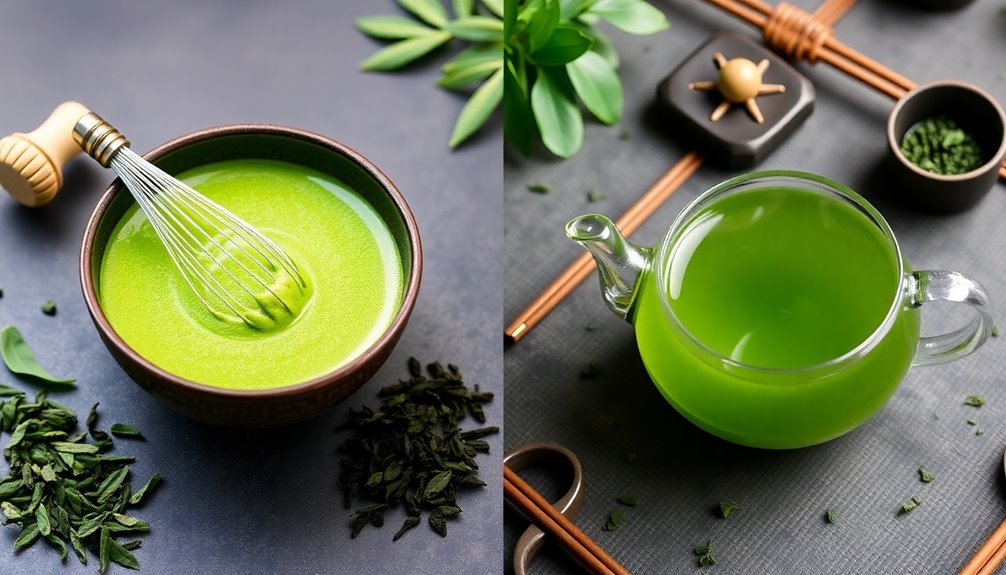
When it comes to practical applications, both matcha and sencha offer unique benefits that cater to different tastes and culinary uses.
Matcha, with its vibrant color, can be whisked into a frothy beverage or added to smoothies, baking, and desserts. Its rich flavor makes it perfect for sweet treats and lattes, bringing joy to any occasion!
On the other hand, sencha is a delightful choice for a quick daily drink. You simply steep loose leaves in hot water, and voilà! You've got a refreshing cup ready to enjoy.
Sencha's refreshing qualities also make it a fantastic addition to savory dishes, balancing flavors beautifully.
Here's a quick look at their culinary applications:
- Matcha: Great for baking, smoothies, and desserts.
- Sencha: Perfect for daily beverages and enhancing savory meals.
Both teas shine in their versatility, allowing you to get creative in the kitchen.
Whether you're making a matcha cake for a party or enjoying a cozy cup of sencha with friends, each tea brings something special to the table.
Frequently Asked Questions
Which Is Better, Sencha or Matcha?
Choosing between sencha and matcha depends on what you want. If you crave a rich, creamy experience with more caffeine, go for matcha. Prefer something lighter and easier to prepare? Sencha's your best bet.
What Is Special About Sencha Green Tea?
Sencha green tea's special because it's Japan's most popular tea, rich in Vitamin C, and offers a bright, vegetal flavor. You'll love its refreshing taste, whether enjoyed hot or cold, and its unique cultivars.
Does Sencha Have More Caffeine Than Matcha?
No, sencha doesn't have more caffeine than matcha. In fact, matcha typically contains two to three times more caffeine since you consume the whole leaf, while sencha offers a milder caffeine experience through steeping.
Is It Better to Drink Matcha or Green Tea?
When deciding between matcha and green tea, consider your goals. If you want a stronger energy boost and higher antioxidants, matcha's your best bet. For a lighter, refreshing experience, stick with green tea.
Conclusion
So, whether you're sipping a warm cup of sencha or whisking up some frothy matcha, both teas bring their own magic to the table! They each have unique flavors, fun uses in cooking, and cool stories from Japan. Next time you're enjoying tea with family or friends, remember the differences and choose your favorite. Cheers to delicious tea moments and happy gatherings! Let's keep exploring and enjoying these wonderful flavors together!

